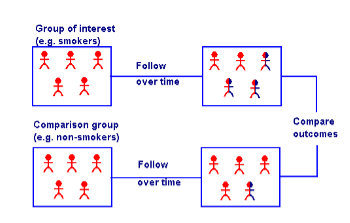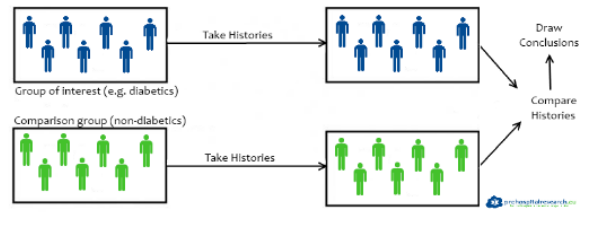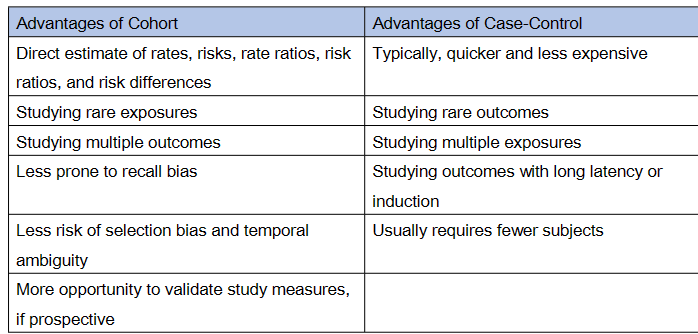Cohort and Case Control Studies- Krysiak
1/24
Earn XP
Description and Tags
10Q on exam
Name | Mastery | Learn | Test | Matching | Spaced | Call with Kai |
|---|
No analytics yet
Send a link to your students to track their progress
25 Terms
Analytical Observational Studies evaluates the relationship between 2 or more variables and do or do not involve control groups?
do
Can observational studies claim cause and effect?
no!
we are only aiming at quantifying an association between variables
aka in analytical observational studies evaluating the “relationship” NOT CLAIMING CAUSE OR EFFECT bc this is OBSERVATIONAL
What questions can we answer with observational studies?
measure effect of exposures
ex: tobacco smoke, unhealthy diet, illicit drug use, etc.
we can add to our understanding of
adverse effects of meds, special populations (kids, pregnant, elderly), co-existing disease states, off-label uses
Do observational studies measure “the usual conditions” or “artificial conditions”? What are those conditions?
the usual conditions:
a typical clinical setting
interventions NOT ASSIGNED
measures real world effects
(FYI: artificial conditions would be like in a lab, under watch and care)
What are incidence rates?
number of people w/ NEW diagnosis of disease/ number of ppl at risk
What are prevalence rates?
number of people with new AND existing disease/ number of ppl at risk
What are point prevalence rates?
number of people w/ new and existing disease/ number of people at risk AT A SPECIFIC POINT IN TIME
Review:
What are the main differences between the 3 types of rates?
incidence- think NEW people diagnosed
prevalence- NEW people+ Previously diagnosed people
point prevalence- like prevalence, EXCEPT it’s a specific point in time
Purpose of cohort study:
presence/absence of the suspected causative factor “risk factor”
Purpose of case-control study:
presence/absence of the suspected outcome “problem”
Is a cohort study prospective, retrospective, or both?
BOTH
Advantages and disadvantages of prospective cohort studies:
advantages:
gather new data to answer research question
use reliable and validated techniques of measurement
clarify if the exposure occurred prior to outcome
disadvantages:
expensive
time consuming
Advantages and disadvantages of retrospective cohort studies:
advantages:
quickly find results
disadvantages:
limited to studying things only available in the data
errors and omissions of factors
Is a case-control study prospective, retrospective, or both?
RETROSPECTIVE ONLY
Example of Cohort study:
FYI
basically were comparing a group exposed to a risk factor (smoking) to those not
we follow them overtime, and see if the outcome we believe develops (ex: lung cancer)

Example of case-control study:
FYI
we take a group that has an outcome (diabetics) to those who don’t (non-diabetics)
we retrospectively look at their histories and draw conclusions from those risk factors
ex: we look at all the diabetics history and see they ate candy for every meal versus the control group who ate a balanced diet all their life… we could conclude that maybe the risk factor of eating candy for every meal leads to diabetes…
remember CANNOT SAY IT CAUSED THE DIABETES THO

Relative risk is used for __________ studies. Odds Ratio is used for ______________ studies.
relative risk: cohort studies
odds ratio: case-control studies
How do you calculate relative risk?
risk exposed / risk unexposed
RR= [a/(a+b)] / [c/(c+d)]
WILL GIVE U EQUATION
YOU JUST HAVE TO KNOW WHERE ON THE TABLE TO FILL IN
RR> 1 means exposure increases risk of outcome
RR< 1 means exposure decreases risk of outcome
![<ul><li><p>risk exposed / risk unexposed</p><ul><li><p>RR= [a/(a+b)] / [c/(c+d)] </p><ul><li><p>WILL GIVE U EQUATION </p></li><li><p>YOU JUST HAVE TO KNOW WHERE ON THE TABLE TO FILL IN</p></li></ul></li></ul></li><li><p>RR> 1 means exposure increases risk of outcome</p></li><li><p>RR< 1 means exposure decreases risk of outcome</p></li></ul>](https://knowt-user-attachments.s3.amazonaws.com/be35a31a-6a0f-49d6-91ed-0cf2b5836b0c.jpeg)
How do you calculate odds ratio?
odds of exposure among cases compared to odds of exposure among controls
Odds ratio= (a/c)/ (b/d) OR (AD)/(BC)
WILL GIVE EQUATION
Advantages of cohort and case-control studies in general:

What is the difference between a population- based and nested case-control study?
population-based: conducted within a defined base pop
nested: conducted within a cohort study
What are the 3 types of bias?
confounding
selection
recall
Explain the 3 types of bias:
confounding
variable other than exposure of interest that affects the outcome
selection
difference between treatment and control groups resulting from the way they were selected
recall bias
ppl may remember things differently than how they occurred
Data sources can be either primary or secondary. Explain each:
Primary: newly gathered for research
like questionnaire, interview, etc.
Secondary: collected for another purpose
like medical claims databases, electronic medical records
Helpful table I made for review of cohort/case-control studies:
Cohort | Case-control | |
|---|---|---|
presence/ absence of: | risk factor | outcome |
type of perspective | both- pro and retro | only RETRO |
good for studying rare: | exposures | outcomes |
calculating | relative risk | odds ratio |
do we have controls? | yes | yes |